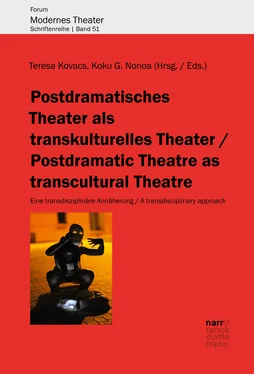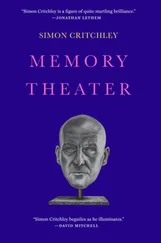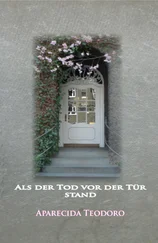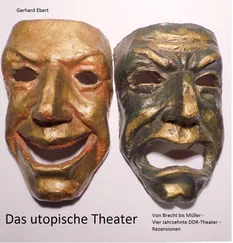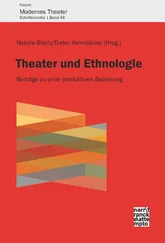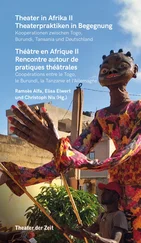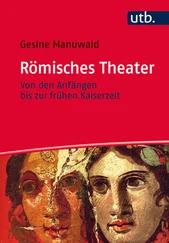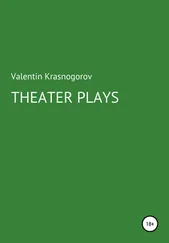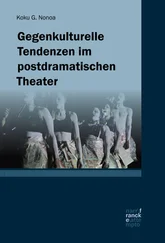The reflexion of the postdramatic from the transcultural perspective and vice versa makes it possible to more concretely grasp both concepts and reveals the large variety of analytical possibilities created by a dialogue between the two concepts. While it is hard to imagine contemporary theatre studies without the concept of postdramatic theatre, the concept of transcultural theatre has been significantly less frequently addressed in the existing literature. What both concepts share, however, is the imprecision of their respective definitions.
“Transcultural Theatre” is often used synonymously with related concepts such as inter- and multicultural theatre. The concept of postdramatic theatre, in turn, has taken on a paradoxical life of its own in the German-speaking world; it has not only become a synonym for director’s theatre and postmodernity due to their common tendencies towards categorization according to art traditions, but it is also discussed in simplified terms as “theatre against the text” or as a dramatic genre supporting neoliberalism.14
This is why it seems relevant to begin this volume, which seeks to promote the Postdramatic for the transcultural analysis of contemporary and international works, with yet another historical contextualisation: the term ‘Postdramatic’ (albeit spelled “post-dramatic”) was first taken up in German theatre studies by Andrzej Wirth in 1987 to characterize the then-latest forms of theatre. Wirth’s discussion of theatre forms of the second half of the 20 thcentury is clearly shaped by Jean-François Lyotard’s early performative theatre approach.
It was he who introduced the term “affirmative aesthetics” to describe new forms of theatre which are characterized by the “independence and the simultaneity of noises-sounds, of words, body arrangements, images” and which abolish the “sign relation and its hollowness.”15 With the term “post-dramatic”, Wirth initially sought to mark a blind spot in academic theatre discourse and to direct attention to all those forms which had largely been ignored because of their divergence from conventional genres. Wirth developed his own approach based on prominent theatre works like, e.g., those by Robert Wilson, Pina Bausch, Richard Foreman, and George Tabori. In the context of the postmodernism debate, he stressed in various publications that theatre had changed in a way that would result in the deconstruction of the drama – theatre dichotomy.
Hans-Thies Lehmann adopted Wirth’s term “post-dramatic”. He first used it in his initial remarks on the 1991 publication Theater und Mythos. Die Konstitution des Subjekts im Diskurs der antiken Tragödie to describe “forms of new and latest theatre in (Post-)Modernity” which are situated “beyond drama.”16 In his publication Postdramatic Theatre he presented his first comprehensive study aimed at bringing together existing research approaches and finding descriptive categories for contemporary forms of play and performance.
Even though the concept of postdramatic theatre is firmly established in the German-speaking research context, it has already been partly abandoned, and there is increasing doubt that it is still useful for analyzing contemporary theatre forms and practices.17 The contributions in this volume show not only that the concept of the Postdramatic is still up-to-date, but also advocate that German-speaking research take a deliberate detour to postdramatic theatre from a contemporary critical perspective instead of simply proclaiming that this concept should be “overcome.” This detour, we shall argue, bears great potential for leading scholarly discourse beyond the boundaries of the German-speaking world.
This is because this concept, after having been discussed and, rightly, called into question as a “German phenomenon”, is increasingly attracting international attention and can therefore serve as the basis for comprehensive, international dialogue. Simultaneously, the historical and cross-cultural approach of postdramatic theatre can be productively advanced in various academic disciplines and be placed in relation to other existing methods and theories. Furthermore, artists from outside of the German-speaking and/or European geographical context are increasingly referring to this concept, situating their work in the field of postdramatic theatre.18
Trans-, inter- and multicultural theatre are reflected upon in this volume as clearly divergent concepts, which are however still related insofar as they address cultural processes of encounter, experience and negotiation in spatiotemporal terms – albeit in fundamentally different ways. While works of theatre based on trans-, inter- and multicultural concepts situate themselves in terms of the categories “own” and “foreign”, there are conceptualized differently in intercultural and multicultural theatre than in the transcultural context. According to Günther Heeg, in this volume transcultural theatre is not understood to be a form or genre in its own right, but as an epistemic and action model.19 As a genuinely cultural practice, theatre in the contemporary context of globalization and internationalization increasingly displays transnational and transcontinental forms of encounter among global cultures. However, while “global cultures […] are marked by their fluidity and the shift or, respectively, abolishment of boundaries”, as Dorothee Kimmich and Schamma Schahadat note, “[they] also develop new strategies of in- and exclusion in this process.”20 The aesthetic and academic scope of this situation is explored by postdramatic theatre as transcultural theatre.
This volume unites contributions by theatre makers and researchers across various disciplines from Europe, Africa, North America, and Asia. It is made up of selected talks that have been elaborated into longer contributions as well as a roundtable held at an international conference with the same title, which took place in Innsbruck between April 14 and 16, 2016. The conference was initiated by Koku G. Nonoa within the framework of the University of Innsbruck’s “Dynamics of the Order(s)” within the research area “Cultural Encounters – Cultural Conflicts” and was organised together with Michaela Senn and Johanna Zorn. In addition to that, this volume presents contributions covering topics and questions that could not be addressed in depth at this conference. The aim is to cement transdisciplinary research as an integrative research approach for this edited volume in order to highlight a mutual academic and practical transfer of knowledge about theatre research and practice and to overcome the gap between theory and practice.
The contributions are oriented towards the terms developed by Hans-Thies Lehmann and Günther Heeg. They discuss both terms critically, expand them by introducing alternative approaches, thus emphasizing the productivity which both concepts can develop when combined with theories and methods from other disciplines.
This edited volume presents a comprehensive range of theories and methods, whereby every theoretical and methodological discussion is illustrated with and tested on concrete examples. Even though this volume focuses on works that were produced or performed in Europe (mainly in Germany), it supplements this spectrum with works created and staged in other cultural contexts and thus hopefully invites a new perspective on the European and non-European theatrical landscape.
The present volume is divided into four thematic areas: “Concepts, Paradigms, Theories”, “Performative Practices and Postcolonial Readings”, “Eliminating and Crossing Boundaries”, and “Collectivity and (Post-) Migration.” The first part, “Concepts, Paradigms, Theories”, is a theoretical reflexion on the concepts of “Postdramatic Theatre” and “Transcultural Theatre”, but beyond that also introduces theoretical concepts and models to describe the transcultural potential of contemporary theatre forms. This part concludes with a podium discussion with international participants debating the historical concept of ‘World Theatre’ in the context of postdramatic and transcultural theatre.
Читать дальше
